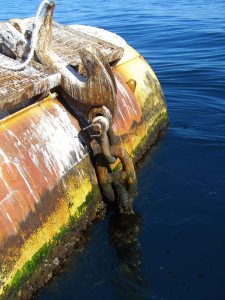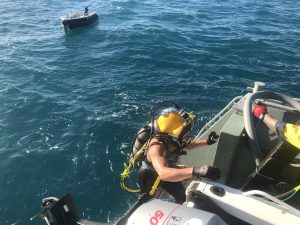December 9, 2021
The baseline in mooring asset integrity is the starting point to maintaining visibility on the condition and life expectancy of the mooring system. Loss of baseline is an emerging trend in large terminal moorings in the region. Typical contributors include lack of funding, lack of competent oversight, deficient maintenance programs and inadequate maintenance.
The impacts and implications of this emerging threat are being felt in all quarters. Pilots need to be acutely aware that, at any moment, station keeping might be compromised with the distinct possibility of a founding. Therefore, the pilot must be review and assess the condition of mooring assets as part of their everyday operational duties (the preventative aspect) and have contingency plans in mind in the event of a mooring failure (the responsive aspect).
The risk of a mooring failure carries with it the risk of consequential harm to nearby vessels, infrastructure, sensitive marine environments. Then there is the immediate costs of recovery and repairs as well as delay in loading and or unloading (if possible) . Finally, there is the legal risk associated with regulatory and civil litigation, permits to operate and insurance. Whomever (and whatever in terms of the environment) bears an immediate loss will seek to recover from the responsible party via intermediates in the causal chain! Where will that end?

In short, loss of baseline means exposure, and if the risk eventuates, the consequences vary from manageable to catastrophic. The stakes are high for all concerned – marine personnel, owners , operators, port authorities, and the state.
The risk mitigator is establishing a mooring baseline as a foundation for a maintenance program. The latter without the former is useless.
The purpose of establishing a mooring baseline is to:
- Predict condition and integrity at any point in time.
- Enable targeted subsea inspection and measurement.
- Establish marine growth cleaning regimes.
- Evaluate changes to mooring system componentry.
- Establish wear and corrosion rates.
- Cost effectively manage integrity of the mooring system.
Having a mooring integrity baseline provides confidence to Operators, Pilots and Regulators that assumptions and assertions as to the integrity of the mooring system are well founded.
Installing a new fully certified mooring system is expensive. At inception of the project is the best and least expensive time to consider the new integrity baseline. But doing so and factoring in the cost at the beginning of the project is often overlooked. Failing to do so will defer and substantially increase the cost when (not if) it becomes necessary to establish a base line. The life of the mooring will likely reduce as the maintenance program is not designed for and tied to the baseline. There will be a commensurate increase in risk while deferring the required action.

Most importantly, an independent third party with the required competence (an experienced mooring engineer) is required to certify the baseline and continuing baseline, otherwise the connection between mooring design intent and fit for purpose is lost. In the absence of that certification, there is no assurance about integrity, only assumptions about design, construction and maintenance; assumptions that are likely to quickly ‘founder’ when tested and challenged after a catastrophic event. Leaning on regulatory bodies without the skills, responsibility, and competency, for tacit acceptance of integrity propositions will not replace the need for diligent mooring asset management and integrity practices. Those days have well passed. Regulators are adept and experienced at demonstrating to courts their limited role.
This article is written by Mike Priestly, Principal Engineer (Mech) and Chartered Naval Architect of ONA Consultants (ONA) and was inspired after a spate of preventable failures where technical risks were realised due to misalignment in stakeholder responsibility, obligations, and actions. ONA Consultants work regionally and provide specialized mooring services to Operators, Pilots and Marine Contractors. ONA also undertakes mooring audits on behalf of vessel owners, government agencies and underwriters.


